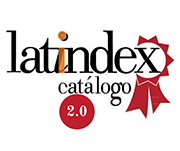Coping styles and wellbeing in university professors: post-COVID-19 period
DOI:
https://doi.org/10.20983/novarua.2024.28.1Keywords:
Coping, Wellbeing, HEI, TeachersAbstract
Given the changes suffered by the population in post-pandemic times, its effects on coping styles and well-being in higher education institutions (HEI) teachers are addressed, as trainers of citizens and future professionals who faced significant changes in education. The coping styles most used by HEI teachers and their relationship with the perception of well-being and other sociodemographic variables were analyzed, using a cross-sectional correlational design in a sample of 203 teachers from the state of Chihuahua, using the Brief Cope Scale and the Satisfaction with Life Scale. The highest values were found in active coping, planning and acceptance, indicating that 38.90% of the participants are highly satisfied with life. Likewise, the demographic variables are correlated despite situations that the population went through, evidencing the most used coping styles and their positive effect on the perception of well-being.
References
Avila-Muñoz, A. (2019). Perfil docente, bienestar y competencias emocionales para la mejora, calidad e innovación de la escuela. Boletín Redipe, 8(5), 131-144. https://dialnet.unirioja.es/servlet/articulo?codigo=7528260.
Bae, M. (2023). Coping strategies initiated by COVID-19-related stress, individuals' motives for social media use, and perceived stress reduction. Internet Research, 33(1), 124-151. DOI: https://doi.org/10.1108/INTR-05-2021-0269.
Blanco, M. A., Blanco, M. E., & Hinojo Vila, B. T. (2021). Actividades de bienestar emocional propuesta para el desarrollo del aprendizaje significativo en tiempos de postpandemia. Conrado, 17(80), 330-338. http://scielo.sld.cu/scielo.php?pid=S1990-86442021000300330&script=sci_arttext&tlng=pt.
Caamal-Ochoa, D. I., & Sanchez-Escobedo, P. A. (2023). Impacto positivo del trabajo académico online en profesores universitarios mexicanos. Revista INFAD de Psicología. International Journal of Developmental and Educational Psychology., 1(1), 99-106. DOI: https://doi.org/10.17060/ijodaep.2023.n1.v1.2485.
Cárdenas-Contreras, G. E. (2022). University Teaching and Competencies for the Postpandemic Era: A Process Towards Digital Literacy. Revista Tecnológica-Educativa Docentes 2.0, 14(2), 5-14. DOI: https://doi.org/10.37843/rted.v14i2.299.
Carver, C. (1997). You Want to Measure Coping But Your Protocol's Too Long: Consider the Brief COPE. International Journal of Behavioral Medicine, 4(1), 92-100. doi:10.1207/s15327558ijbm0401_6
Carver, C. S., Scheier, M. F., & Weintraub, J. K. (1989). Assessing coping strategies: a theoretically based approach. Journal of Personality and Social Psychology, 56(2), 267-283. DOI: https://doi.org/10.1037//0022-3514.56.2.267.
Cooper, C., Katona, C., Orrell, M., & Livingston, G. (2008). Coping strategies, anxiety and depression in caregivers of people with Alzheimer's disease. Int J Geriatr Psychiatry, 23(9), 929-936. DOI: https://doi.org/10.1002/gps.2007.
Costa, C., Palma, X., & Salgado, C. (2021). Docentes emocionalmente inteligentes. Importancia de la Inteligencia Emocional para la aplicación de la Educación Emocional en la práctica pedagógica de aula. Estudios pedagógicos (Valdivia), 47, 219-233. DOI: http://dx.doi.org/10.4067/S0718-07052021000100219.
Crismatt-Romero, D. (2024). Educación Positiva, una Sinergia entre la Escuela y la Familia hacia el Éxito y el Bienestar. Ciencia Latina Revista Científica Multidisciplinar, 8(1), 4386-4407. DOI: https://doi.org/10.37811/cl_rcm.v8i1.9779.
Dávila, C., & Jiménez, G. (2014). Sentido de pertenencia y compromiso organizacional: predicción del bienestar. Revista de psicología (PUCP), 32(2), 271-302. http://www.scielo.org.pe/scielo.php?pid=s0254-92472014000200004&script=sci_arttext.
Diener, E., Emmons, R. A., Larsen, R. J., & Griffin, S. (1985). The Satisfaction With Life Scale. Journal of Personality Assessment, 49(1), 71-75. DOI: https://doi.org/10.1207/s15327752jpa4901_13.
Eidman, L., Bender, V., Arbizu, J., Lamboglia, A. T., & CorreadelValle, L. (2020). Bienestar emocional, psicológico y social en adultos argentinos en contexto de pandemia por covid-19. Psychologia. Avances de la disciplina, 14(2), 69-80. DOI: https://doi.org/10.21500/19002386.4851.
Folkman, S., & Lazarus, R. S. (1988). Ways of Coping Questionnaire. PsycTESTS Dataset. DOI: https://doi.org/10.1037/t06501-000.
Folkman, S., Lazarus, R. S., Dunkel-Schetter, C., DeLongis, A., & Gruen, R. J. (1986). Dynamics of a stressful encounter: cognitive appraisal, coping, and encounter outcomes. Journal of Personal Social Psychology, 50(5), 992-1003. DOI: https://doi.org/10.1037//0022-3514.50.5.992.
Gamero-Tafur, K., Medina-Martínez, E. M., & Escobar-Espinoza, Á. A. (2017). La felicidad en estudiantes universitarios de ciencias económicas: algunos determinantes socioeconómicos en la ciudad de Cartagena de Indias. Aglala, 8(1), 193-213. DOI: https://doi.org/10.22519/22157360.1032.
García-Chamorro, D. A., Aristizábal-Vélez, P. A., & Vélez-Álvarez, C. (2024). Satisfacción con la vida en la comunidad universitaria de una Universidad Colombiana en tiempo de pandemia. Ánfora: Revista Científica de la Universidad Autónoma de Manizales, 31(56), 178-199. https://dialnet.unirioja.es/servlet/articulo?codigo=9261298.
García-Jiménez, M. (2018). Bienestar emocional en educación: empecemos por los maestros (Tesis doctoral). Universidad de Murcia. https://www.tdx.cat/bitstream/handle/10803/462818/TMEGJ.pdf.
García-Viniegras, V., & González, I. (2000). La categoría bienestar psicológico: Su relación con otras categorías sociales. Revista Cubana de Medicina General Integral, 16(6), 586-592. http://scielo.sld.cu/scielo.php?pid=S0864-21252000000600010&script=sci_arttext&tlng=pt.
Gil-Monte, P. R. (2009). Algunas razones para considerar los riesgos psicosociales en el trabajo y sus consecuencias en la salud pública. Revista Española de salud pública, 83, 169-173. https://www.scielosp.org/article/ssm/content/raw/?resource_ssm_path=/media/assets/resp/v83n2/editorial3.pdf.
Gomez-Hernández, C. A. (2009). El estrés laboral: una realidad actual. Summa Humanitatis, 3(1).
Giovanis, E., & Ozdamar, O. (2023). Coping Strategies, well-being and inequalities during the COVID-19 pandemic period. Current Psychology. DOI: https://doi.org/10.1007/s12144-023-04710-1.
Hernández-Sampieri, R., & Mendoza-Torres, C. (2018). Metodología de la investigación: las rutas cuantitativa, cualitativa y mixta. McGraw Hill México.
Hung, M. T., Hung, L. S., & Hung, L. C. (2023). Validating the Teacher and Classmate Support Scale for Taiwanese Adolescents. Open Journal of Social Sciences, 11(3), 448-456. DOI: https://doi.org/10.4236/jss.2023.113032.
Kemmis, S. (2023). Facing the world: Pedagogical praxis through a postpandemic prism. Journal of Praxis in Higher Education, 5(1), 7-27. DOI: https://doi.org/10.47989/kpdc334.
Kobau, R., Sniezek, J., Zack, M., Lucas, R. E., & Burns, A. (2010). Well‐being assessment: An evaluation of well‐being scales for public health and population estimates of well‐being among US adults. Applied Psychology: Health and Well‐Being, 2(3), 272-297. DOI: https://doi.org/10.1111/j.1758-0854.2010.01035.x.
Lau, Y., Tha, P. H., Wong, D. F. K., Wang, Y., Wang, Y., & Yobas, P. K. (2016). Different perceptions of stress, coping styles, and general well-being among pregnant Chinese women: a structural equation modeling approach. Archives Of Women's Mental Health, 19(1), 71-78. DOI: https://doi.org/10.1007/s00737-015-0523-2.
Lazarus, R., & Folkman, S. (1984). Stress, Appraisal, and Coping. Spriger Publishing Company, Inc.
López-Rodríguez, V., Montalván-López, A., Díaz-García, A., Scott, G., & Ramos-Lucca, A. (2023). Uso de Alcohol o Sustancias Durante la Cuarentena: Sintomatología Psicopatológica y Estrategias de Afrontamiento. Revista Caribeña de Psicología, 7(1), e7457. DOI: https://doi.org/10.37226/rcp.v7i1.7457.
Lucas-Carrasco, R. (2012). The WHO quality of life (WHOQOL) questionnaire: Spanish development and validation studies. Quality of Life Research, 21(1), 161-165. DOI: https://doi.org/10.1007/s11136-011-9926-3.
Martins-Guerra, V., Alves-Freires, L., Albuquerque-da-Costa, J. C., Eisenbeck, N., Carreno, D. F., Monteiro, R. P., . . . da-Silva, J. A. (2023). The COVID-19 pandemic and its effect on the Brief-COPE structure. Ciencias Psicológicas, 17(1), e2476. DOI: https://doi.org/10.22235/cp.v17i1.2476.
Mohan, K. P., Peungposop, N., & Kalra, P. (2023). Psychosocial Influences on Coping and Wellbeing during the Covid-19 Lockdown in the Early Days of the Pandemic: A Mixed Methods Research. Applied Research in Quality of Life, 18(1), 163-193. DOI: https://doi.org/10.1007/s11482-022-10115-2.
Muñoz-Campos, E., Fernández-González, A., & Jacott, L. (2018). Bienestar subjetivo y satisfacción vital del profesorado. REICE. Revista Iberoamericana sobre Calidad, Eficacia y Cambio en Educación, 16(1), 105-117. https://www.redalyc.org/articulo.oa?id=55160047007.
Nakano, K. (1991). The role of coping strategies on psychological and physical well-being. Japanese Psychological Research, 33(4), 160-167. DOI: https://doi.org/10.4992/psycholres1954.33.160.
Nazari, F., Ghanizadeh, A., & Mirzaee, S. (2023). EFL teachers' coping strategies amidst the Covid-19 virtual education and their association with work engagement and teacher apprehension. Educational Research for Policy and Practice, 22(1), 1-22. DOI: https://doi.org/10.1007/s10671-022-09317-0.
Obinguar, A. N., Tuquib, F. M., Iglesia, J. S., Collamat, C. P., & Derasin, L. M. C. (2023). The stress profile and coping mechanism among the public school teachers in the resumption of face-to-face classes. Acta Biomed, 94(1), 1692-1700. https://mattioli1885journal.com/article/2023/1692.pdf.
Ortiz, E. (2022). El bienestar emocional en tiempos de post-pandemia en la educación superior. Centro Sur, 4(3). https://www.centrosureditorial.com/index.php/revista/article/view/262.
Patlán, J., Navarrete, D. M., & García, R. (2011). Perspectiva organizacional y psicosocial de los efectos de las organizaciones en la salud ocupacional del factor humano. XV Congreso Internacional de Investigacion en Ciencias Administrativas, Boca del Río, Veracruz, México. https://repository.uaeh.edu.mx/bitstream/handle/123456789/11616.
Pérez-Zapata, D., Peralta-Montecinos, J., & Fernández-Dávila, P. (2014). Influencia de variables organizacionales en la calidad de vida laboral de funcionarios del sector público de salud en el extremo norte de Chile. Universitas Psychologica, 13(2), 541-551. DOI: https://doi.org/10.11144/Javeriana.UPSY13-2.ivoc.
Ponce-Alencastro, J., Zambrano-Saltos, R., & Rodríguez-Álava, L. (2022). SARS–Cov–2 y teletrabajo: Estilos de afrontamiento frente al estrés laboral en docentes universitarios. Revista Científica Arbitrada en Investigaciones de la Salud GESTAR, 5(9), 153-168. DOI: https://doi.org/10.46296/gt.v5i9edespmar.0060.
Rodney, M. T., Ojela, B. A., Sheila, S. D., Lapore, M. A., D. Martin, M. A., P. Urmeneta, M. L. E., & L. Angoluan, M. (2023). Finding Satisfaction in Life: Correlational Study on Relationship of Self-Reflection, Resilience, and Life Satisfaction. European Modern Studies Journal, 7(2), 157-166. DOI: https://doi.org/10.59573/emsj.7(2).2023.15.
Ryff, C. D., & Singer, B. (1998). The Contours of Positive Human Health. Psychological Inquiry, 9(1). DOI: https://doi.org/10.1207/s15327965pli0901_1.
Sandín, B., & Chorot, P. (2003). Cuestionario de Afrontamiento del Estrés (CAE): Desarrollo y validación preliminar. Revista de Psicopatología y Psicología Clínica, 8(1), 39-53. DOI: https://doi.org/10.5944/rppc.vol.8.num.1.2003.3941.
Sharma, M. (2013). Coping strategies. En Salem Press Encyclopedia of Health. Salem Press.
Takizawa, Y., Matsumoto, Y., & Ishimoto, Y. (2023). Relationship between teacher and student psychological well-being in a Japanese context. International Journal of School & Educational Psychology, 1-15. DOI: https://doi.org/10.1080/21683603.2023.2271411.
Temkin, B., & Cruz-Ibarra, J. (2018). Las dimensiones de la actividad laboral y la satisfacción con el trabajo y con la vida: el caso de México. Estudios sociológicos, 36(18), 507-538. DOI:https://doi.org/10.24201/es.2018v36n108.1608.
Vadivel, R., Shoib, S., El Halabi, S., El Hayek, S., Essam, L., Bytyçi, D. G., ... & Kundadak, G. K. (2021). Mental health in the post-COVID-19 era: challenges and the way forward. General psychiatry, 34(1). DOI: https://doi.org/10.1136/gpsych-2020-100424.
Veenhoven, R. (1994). El estudio de la satisfacción con la vida. Intervencion Psicosocial, 3, 87-116. https://repub.eur.nl/pub/16195/.
Vieco, G. F., & Abello, R. (2014). Factores psicosociales de origen laboral, estrés y morbilidad en el mundo. Psicología desde el Caribe, 31(2), 354-385. http://www.scielo.org.co/scielo.php?pid=S0123-417X2014000200009&script=sci_arttext.
WHO (2023). ¿Cómo define la OMS la salud? Organización Mundial de la Salud, página web. https://www.who.int/es/about/frequently-asked-questions#:~:text=%C2%BFC%C3%B3mo%20define%20la%20OMS%20la,ausencia%20de%20afecciones%20o%20enfermedades%C2%BB.
Downloads
Published
Issue
Section
License
Copyright (c) 2024 Angelica Calderón Ordóñez, Armando Esquinca Moreno, Bertha Estrada Lázaro

This work is licensed under a Creative Commons Attribution-NonCommercial-ShareAlike 4.0 International License.
All contents of the electronic edition of the journal are distributed under a license and distribution "Creative Commons Attribution-Noncommercial-ShareAlike 4.0 International" (CC-BY-NC-SA). You can see from here the informative version of the license.
Those authors/publications as having this journal agree to the following terms:
a) Is allowed and recommends authors / as disseminate their work via the Internet (p. eg .: institutional telematic files or on their website), which can produce interesting exchanges and increase appointments of the published work. (See The Effect of Open Access).












